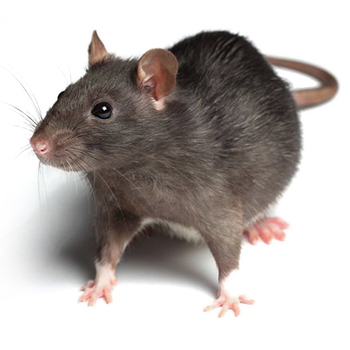Pennsylvania Rat Control

Rats are unwelcome pests in homes and businesses throughout Pennsylvania. These pests frustrate home and business owners because they often leave evidence of their presence out in the open, but are skilled at staying hidden from view most of the time. Rats are more than just annoying pests, however, because they can spread diseases to humans and destroy property. Expert protection against these rodents can help you protect the people who come into your home or business as well as the items that you value. To protect your Pennsylvania home or business from rats, you need to learn about the behavior of this pest, take steps for prevention, and find effective treatment options should an infestation occur.
What Are Rats?
Rats are mammals that fall into the category of rodents. Rodents are categorized as gnawing mammals and have incisors that never stop growing. Viking Pest’s Pennsylvania pest control experts explain rats chew on a wide range of materials, such as wood, to keep the growth of their incisors in check. These large rodents also use their teeth to shred materials that they use to build nests, like insulation and cardboard. In Pennsylvania, the type of rat that causes the most problems for home and business owners is called the Norway rat. The Pennsylvania Game Commission provides a detailed description of the physical and behavioral attributes of this pest, such as its weight, which ranges from 10 ounces to 1 pound.
Anticimex SMART Rodent Control
Viking is Pennsylvania’s exclusive provider of SMART rodent control, an advanced pest management program that utilizes infrared monitoring and automated messaging to manage mice 24/7. SMART is a non-toxic solution to rodent problems that works at residential, commercial, and municipal levels.
How to Identify Rats
Rats range in size from 13 to 18 inches according to the Department of Agriculture at Penn State. These pests are covered in hair with coloring that can be brown, reddish, or black. Rats also have short ears and thick, hairless tails. In order to differentiate between mice and rats, The Pennsylvania pest control experts at Viking pest recommend looking at their body size, ears, and tails for help. Rats are much larger than mice, have small ears, and have tails that are shorter than the length of their bodies.
What Problems Can Rats Cause for Pennsylvania Home and Business Owners?
The Centers for Disease Control and Prevention points out that rats have the potential to spread over 35 different types of diseases. Some of these diseases, such as Hantavirus and Rat-Bite Fever, can be directly transmitted by rats. Others, such as Scrub Typhus, can spread indirectly from rats. The spread of disease can occur through a bite, contact with rat feces, urine, or saliva, and through food contamination. Rats have the ability to contaminate food and surfaces in your Pennsylvania home or business without you even realizing they were there. Rats often come out in search of food during the night or at dusk in Pennsylvania, which can make it difficult to spot activity.
Rats also have the ability to cause physical damage to the items inside your home or business, such as cardboard storage boxes, pipes, and wiring. Rats gnaw on a wide range of materials to help control tooth growth and to collect supplies for nest building. Rats shred insulation, paper, and fabrics to use in their nests. When rats damage building materials and wiring, it can put your home or business in Pennsylvania at risk for secondary damage from an electrical fire.
When Are Rats Active in Pennsylvania?
Rats can be active all year long. However, as the weather starts to cool, many home and business owners in Pennsylvania start to notice rat activity. This is because rats are on the search for warm shelter and a consistent food supply for when the Pennsylvania winter moves in. The Pennsylvania pest control experts at Viking Pest explain the temperature-controlled environment of your home or office building is an ideal place for rats to nest through the winter.
How to Control Rats in Pennsylvania
Effective rat pest control in Pennsylvania involves both prevention and treatment. Experts at Penn State point out it only takes a small opening for rats to squeeze through. These rodents can get into your Pennsylvania home or building through a hole the size of a quarter. In order to protect against an infestation, the Pennsylvania pest control experts at Viking Pest recommend sealing up holes or breaches along the perimeter of your property that occurred from damage, such as wood rot, animal or pest activity, or a shifting foundation.
The best way to get rid of rats that have infested your Pennsylvania home or business is with the help of a pest control expert. Rats typically nest in areas that have low traffic and provide them with some type of protection. This means it may be difficult for you to find the areas in your home or business where the rats have nested. You can get expert help finding and dealing with rats that have infested your home from Viking Pest Control. Give Viking Pest a call and schedule an inspection to determine if you have a rat infestation in your Pennsylvania home or business and get treatment recommendations for eradication.
How to Prevent Rodents During a Renovation
According to statistics, mice and other rodents invade approximately 21 million homes during the winter in the US. Besides causing extensive damage, mice can also carry a variety of diseases, including salmonella and hantavirus.
If you are renovating a home, this can open even more opportunities for rodents to get in, especially if it is left unoccupied for certain periods without rat and mice control.
To protect your home and renovating projects from mice, our mice exterminators state how to deter and eradicate them.
Clear up the Yard
During renovations, it’s easy for the yard to get cluttered. Piles of building debris and materials can mount up, as well any garbage from the remodeling/renovation process.
Unfortunately, this can create a paradise for mice. Mice love piles of wood, unraked leaves, garbage heaps, etc., explain the rodent control experts at Viking.
This gives mice cover to hide in before they make an entry into your home. To discourage this, our pest control experts recommend clearing any unnecessary heaps of building refuse. Stack materials neatly, rake up dead leaves and dispose of woodpiles.
Get Rid of Garbage and Food
Do you have any full trash cans standing about? Maybe with food containers in them? If so, you want to empty these as soon as possible.
Garbage cans can act as both a food source and a place of shelter for incoming mice.
Seal the House
If you are renovating an older house, chances are there’re some chinks and cracks here and there that mice could get through. Mice and rats and can squeeze through very small holes and crevices and find their way into your home.
To stop this from happening, and prevent mice from invading your home and its renovations, Viking’s pest management professionals recommend making it a priority to seal up your eaves, windows, doors, and vents as soon as you can in the renovation process.
Protecting Your Pennsylvania Home or Business From Rats With Viking Pest Control
Viking Pest offers expert treatment designed to effectively and efficiently control and prevent rats from invading your home or business in Pennsylvania. Our use of Integrated Pest Management (IPM) techniques focuses on finding the core of the pest concern and controlling rats from the source. Through IPM, pest control materials are selected and applied in a manner that minimizes risks to human health, pets, and the environment. Call Viking today for your FREE and NO OBLIGATION estimate at 1-800-618-2847 or schedule online today!















